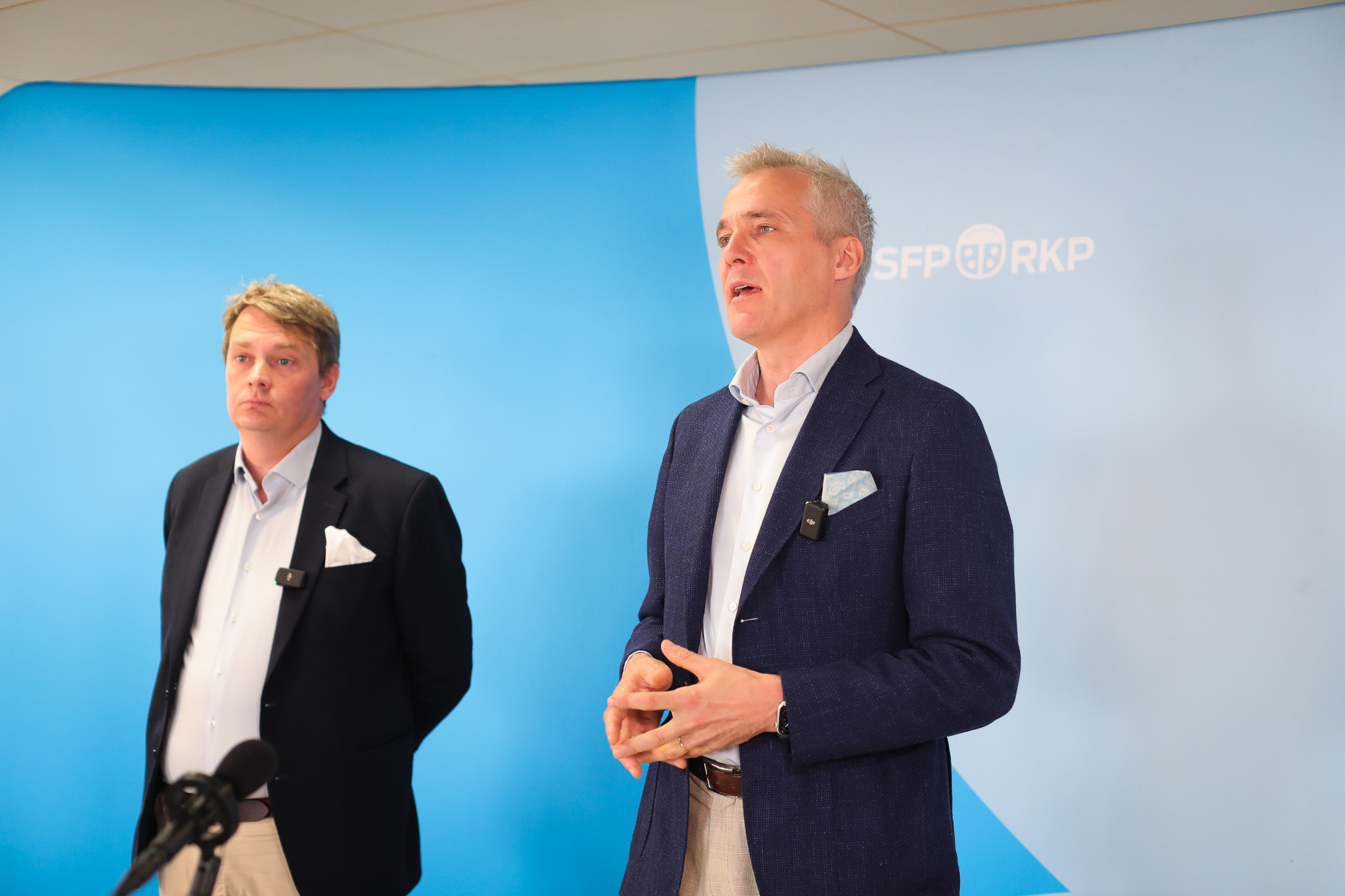“Finland needs growth. It is only through growth that we can secure our welfare and services in the long term. We need a climate that incentivises and encourages people and companies to invest and employ in Finland,” says the Chair of the Parliamentary Group, Otto Andersson.
“It must be worth it for people and businesses to build their futures in Finland. We need blossoming enterprises that grow, create jobs and generate tax income. That is how we strengthen the country’s well-being in the long term. Exports are our engine for growth,” explains Party President, Minister of Education Anders Adlercreutz.
During its summer meeting, the Swedish Parliamentary Group raised four main points that are crucial for boosting Finland’s growth: investment, foreign labour, business growth and strong human capital.
Finland needs investment
1. Finland must actively promote the establishment of a new green industry, as well as enhancing the sustainability of its existing industry. Greater collaboration is needed between industry and the public sector to speed up this transition. It is necessary for the government to abide by Finland’s historical investment of EUR 1 billion into research and development during this parliamentary term. We must incentivise investments into the green transition. Investments into sustainable and renewable energy and our planned tax incentive for large-scale industrial projects are necessary for furthering the green transition.
2. The ownership requirement for tax-free dividends from listed companies must be reduced. Currently, unlisted corporate shareholders who own at least 10 per cent of a listed company receive dividends from that company tax free. To reinforce domestic ownership and encourage investment in Finland, this tax exemption must be extended to include smaller shareholders.
3.The permit authorities’ temporary priority procedures for permit applications related to the green transition must be extended. For Finland to have a predictable investment climate, permit processes must be speedy and smooth. The temporary “priority lane” for court appeals processes also needs to be extended and have sufficient resources to prevent unnecessary delays.
4.We need a temporary tax exemption for sales of forested land property to reinforce the forest industry’s access to raw material. A portion of Finland’s forests is currently owned by undivided estates and persons who have inherited forested properties but have no interest in forestry. By allowing a three-to-four-year tax exemption on the sale of forested properties, we can increase the efficiency of forestry and timber sales.
5.The opportunities of Finland’s domestic defence industry must be utilised. The war in Ukraine has demonstrated that the European defence industry does not invest to the necessary extent. The EU market also continuously comes up against protectionist obstacles. Europe’s self-defence capacity must be increased. Finland has potential for reinforcing its domestic supply chain from raw material to end product. Within the EU, Finland must work towards a functioning internal market in defence goods, and towards removing the existing financing obstacles.
6. The profitability of the Finnish food and drinks sector must be reinforced, and its exports increased. The main measures listed in the Government Programme for improving the role of primary producers in the food supply chain – such as revising the Competition Act, the Food Market Act and the Public Procurement Act – must be seen through as quickly as possible. The permanent food export investments, applicable from 2025 onwards, that were included in the budget must also be put into effect.
7. Collaboration between the state, municipalities and regions must be improved when it comes to large-scale industrial investments. Bridge agreements, for example, have had a positive impact on improving local vitality. We want to have effective tools for enhancing collaboration on large-scale investments, so that municipalities can swiftly respond to the needs of such investors.
8. Finland’s national banking regulations must support growth and the corporate sector’s financing opportunities, instead of overregulating. Small and medium-sized enterprises in particular are having difficulties obtaining loans to support their business.
Finland needs more labour immigration
9. Net immigration must rise to at least 40,000 inhabitants per year. This is a necessity if we are to secure our welfare state. We must listen to the business sector and its needs. The target must be actively followed up on and further measures must be put into place if it is not reached. Finland’s national image needs improving if we are to attract labour from abroad. It is also important to create good conditions for the entire migrating family, when it comes to both work permits and study opportunities. Finland should be an attractive target country for the whole family.
10. Needs testing of foreign labour must be abolished. Companies themselves know best what kind of labour they need. Therefore, unnecessary recruitment obstacles must be removed. Without labour, it is impossible for companies to grow.
11. A two-week service promise must be instilled for labour immigrants. Persons who choose to come to Finland for work must be allowed swift access into the society. They must be granted Finnish IDs, work permits and bank accounts, as well as day care and school places for their children, within two weeks. The majority of such matters must be taken care of digitally, according to the single service point model.
12. Permanent resident status must automatically be granted to foreign students who complete a matriculation exam in Swedish or Finnish, or a higher education degree in Finland. It is a gain for the whole society if people who are educated in Finland stay here. Therefore, foreign students who complete a Finnish higher education degree should also receive partial compensation for their study fees if they stay and work in Finland for a specified time period.
13. There should be a temporary tax incentive for people to move back to Finland. There are many Finns living in foreign countries considering a return to their homeland. We should encourage them to do so by offering a temporary income tax incentive.
14. It must be possible for municipalities to arrange schooling in English. This would particularly benefit families with children, where one or both parents move to Finland for work. It is important to offer the whole family an opportunity to become established here. It should also be possible to take the matriculation exam in English.
Our companies need better conditions for growth
15. The time allowed for companies to write off losses must be doubled to twenty years. Our competing countries allow companies twice or even three times as much time as Finland does to write off losses in taxation. This is why it can be more beneficial for example for start-ups to move their operations out of Finland. By doubling the allowance, we would incentivise companies to stay.
16. Companies that reinvest profits into their operations must receive tax incentives. We should lower the threshold for companies to invest in their operations, to create conditions for growth. Companies should particularly be encouraged to invest in research and development.
17. Education policy should be better synchronised with new industrial policy. A growing market needs new competence. We should enhance the business sector’s access to competent and motivated workers by reinforcing its dialogue and collaboration with the education sector. We must secure sufficient work experience places for secondary students by increasing cooperation between educational providers and workplaces.
18. Infrastructure investments that benefit exports and imports must be prioritised. Finland’s geographical location in northern Europe means that infrastructure plays a central role in our foreign trade. The state must proactively contribute infrastructure financing to support projects and sectors with growth potential.
19. We must gradually abolish inheritance and gift tax. Following the Swedish model, we should gradually give up inheritance tax and replace it with a gains tax. At the initial stage, inheritance tax should be abolished for generational shifts within business and agriculture. We should make it as easy as possible for family businesses to continue operating under Finnish ownership.
We must take care of our human capital
20. Cultural and fitness benefits must be made available to sole traders. More than one half of Finland’s entrepreneurs are sole traders. Self-employment is more common among women than men. Current tax legislation means that most self-employed people do not have access to cultural or fitness benefits. We want these benefits to be available to all entrepreneurs. In the long term, the level of the benefit should also be increased, which will positively impact the cultural sector.
21. Employers must be allowed to cover employees’ moving and travel costs tax-free. This should apply to moves both into and within Finland. The threshold for potential employees to move for work should be as low as possible. The tax credit for household expenses should also be expanded to cover moving and renovation costs.
22. We must reinforce equality in the workplace by establishing anonymous recruitment processes. Women and persons with an immigrant background in particular benefit from anonymous recruitment. By increasing equality and equal opportunities, we can enhance labour market efficiency and increase access to workers.
23. We must improve part-time entrepreneurs’ social security by establishing a combination insurance. We must increase the income security of those employed or self-employed in creative industries. The combination insurance must come into effect as soon as possible.
24. Shorter study units must be created to enhance lifelong learning. Employees should have greater flexibility to complete smaller study units that add to their degrees and personal development. Instead of taking completely new degrees, people could increase their competence and occupational well-being by completing smaller units.
25. We must have flexible solutions for partial work incapacity. Instead of forcing young people to take permanent disability pensions, we must invest more into occupational rehabilitation for young people, as well as securing the “therapy guarantee”. Flexible solutions can be found for ensuring more young people stay in the labour market. More routes into work are also needed, particularly for adolescents and young adults.
26. We must initiate planning of a new family leave reform. It should be easier to combine work with having a family. We want to promote equal participation in family leave. Early childhood education must be made free for all families in the long term. We want to explore the possibilities for grandparents and other close persons in employment to stay at home and look after a sick child, under the same conditions as the child’s guardians.






